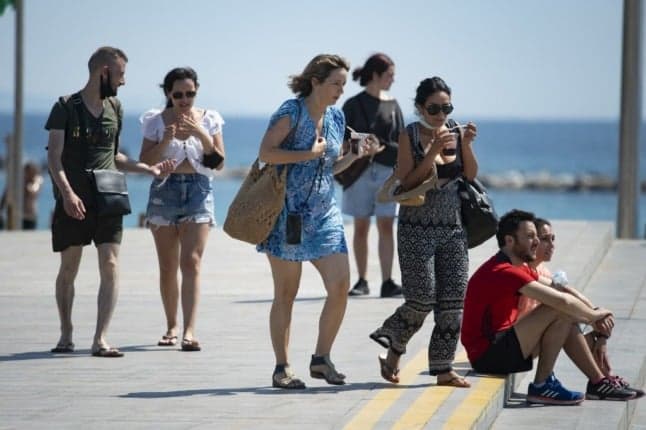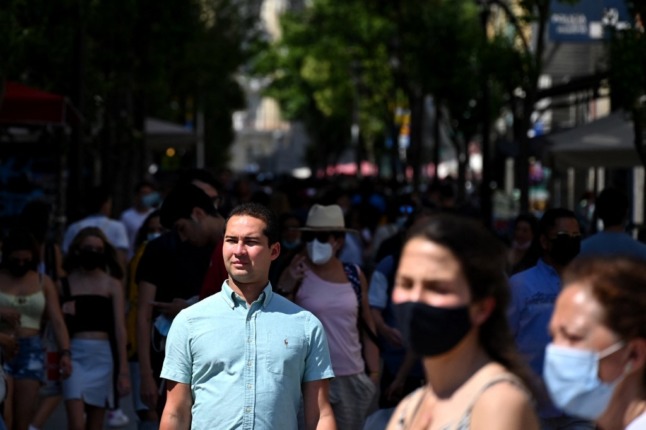'Explosive transmission': What you need to know about Spain's fifth Covid wave

Spain has seen its Covid infection rate more than double in under two weeks, with epidemiologists confirming it as the start of the country's fifth wave. Here's why it's different to previous waves and how it could affect the vaccine campaign, local restrictions and more.
Faster rise in cases than the other Covid waves
The fifth wave reportedly started on June 22nd when the fortnightly infection rate from the fourth wave was at its lowest: 92 cases per 100,000 inhabitants.
In just thirteen days it has increased 121 percent, a faster rise than all previous coronavirus waves in Spain, although data for the first wave can’t be deemed fully accurate given the lack of knowledge about Covid-19 in March 2020.
On Monday July 5th, the Spanish government’s chief epidemiologist Fernando Simón confirmed that in just three days the fortnightly infection rate had climbed 33 percent across Spain. It took only a weekend for the incidence of the virus to increase 52 points up to 204 cases per 100,000 people.
Coronavirus infections have shot up in particular among people aged 16 to 30 in Spain, but also among younger children (infection rate of 584 cases per 100,000 in 12 to 19 year olds).
It won’t just affect unvaccinated young people
The infection rate among 20 to 29 year olds may have already tripled up to 640 cases per 100,000 people but according to leading epidemiologist and former WHO directive Daniel Lopez Acuña people in the 60 to 69 age group - most of whom have only had their first dose of the AstraZeneca vaccine - are still at risk.
Infections among teens and twenty-somethings may also affect the vaccination plans of people in their thirties, with some regions suggesting that the younger groups should be prioritised over people in the 30 to 39 age group.
For López Acuña there’s "little logic and epidemiological sense" to bringing forward the vaccination of young people, saying that instead people in their sixties should be fully vaccinated “as soon as possible” despite the “explosive community transmission" among young people.
The epidemiologist warned that although many young people are asymptomatic, "that doesn’t mean they may not be admitted to hospital or even be at risk of death".
Primary Care services in Catalonia and Cantrabria are reportedly overwhelmed by the rise in cases, due to the increased number of young patients with mild Covid symptoms and a huge demand for PCR testing.
‼️ Madrid no registra ningún fallecido por COVID-19 este martes 6 de julio.
🔴 Por primera vez desde el 28 de julio de 2020.
✅ Precaución para acabar definitivamente con el virus.
— Comunidad de Madrid (@ComunidadMadrid) July 7, 2021
However, the number of people being admitted to hospital with Covid-19 across Spain is three times lower than during the fourth wave.
The number of Covid deaths during this fifth wave is also six times lower so far than it was back in April, according to Health Ministry figures.
 (Photo by Gabriel BOUYS / AFP)
(Photo by Gabriel BOUYS / AFP)
High infection rates favour variant development
According to López Acuña there is a worrying sense of "false security" and that although those infected are usually asymptomatic, high community transmission increases the chances that “variants that can escape from vaccines” will emerge.
Although the Covid-19 outbreak in Mallorca that has led to hundreds of cases being detected across a number of Spanish regions belongs to the Alpha variant, the incidence of the Delta variant in Spain has quintupled up to 10 percent of all new cases.
Researchers and public health officials believe the Delta strain, first identified in India, will become dominant in Spain by mid-July.
READ ALSO:
Coronavirus: How much is the Delta variant spreading in Spain?
Based on its higher transmissibility and model forecasts, the European Centre for Disease Prevention and Control (ECDC) also predicts that 70 percent of new coronavirus infections will be due to this variant in the European Union in early August and “represent 90 percent of all SARS-CoV-2 viruses circulating in the EU at the end of August”.
There has been no increase in reinfections associated with the Delta variant or any indication that existing Covid-19 vaccines protect less against this B.1.617.2 variant than against other variants, according to the latest ECDC data.
However, a preliminary study by Israel’s Health Ministry found that the BioNTech/Pfizer vaccine is less effective at stemming the spread of the Delta variant than previous strains of Covid.
Could it mean more restrictions?
Spain’s fourth wave was referred to as a ‘little wave’ by epidemiologist Fernando Simón as the initial rise in cases was slower than previous waves and the infection rate peaked at 149 cases per 100,000 people.
The emergence and meteoric rise of the fifth Covid-19 wave in Spain has perhaps caught Spanish authorities off guard, having ended the state of alarm in May, eased restrictions and reopened its borders to national and some international travellers.
It has also highlighted how challenging it may be for Spanish authorities to control rising infection rates during the summer without the special powers the state of alarm provided national and regional governments to quickly roll out new restrictions. However, Spain’s regions can still find the legislative help needed to toughen rules such as opening times and capacities.
According to López Acuña, Spain should at least close nightclubs and bars even though most have only just reopened recently after 15 months of restrictions, together with “controls at places where infections are taking place”.
The spike in infections is also likely to affect Spain’s ailing tourism industry, with Germany and Belgium already announcing travel restrictions for Catalonia and Cantabria.
UPDATE: Spain’s Catalonia reimposes Covid measures as cases spike
Authorities in both these regions, as well as Asturias, Madrid, Castilla y León and the Valencia region have said they are currently studying the possibility of reintroducing restrictions to stem infections.
Comments
See Also
Faster rise in cases than the other Covid waves
The fifth wave reportedly started on June 22nd when the fortnightly infection rate from the fourth wave was at its lowest: 92 cases per 100,000 inhabitants.
In just thirteen days it has increased 121 percent, a faster rise than all previous coronavirus waves in Spain, although data for the first wave can’t be deemed fully accurate given the lack of knowledge about Covid-19 in March 2020.
On Monday July 5th, the Spanish government’s chief epidemiologist Fernando Simón confirmed that in just three days the fortnightly infection rate had climbed 33 percent across Spain. It took only a weekend for the incidence of the virus to increase 52 points up to 204 cases per 100,000 people.
Coronavirus infections have shot up in particular among people aged 16 to 30 in Spain, but also among younger children (infection rate of 584 cases per 100,000 in 12 to 19 year olds).
It won’t just affect unvaccinated young people
The infection rate among 20 to 29 year olds may have already tripled up to 640 cases per 100,000 people but according to leading epidemiologist and former WHO directive Daniel Lopez Acuña people in the 60 to 69 age group - most of whom have only had their first dose of the AstraZeneca vaccine - are still at risk.
Infections among teens and twenty-somethings may also affect the vaccination plans of people in their thirties, with some regions suggesting that the younger groups should be prioritised over people in the 30 to 39 age group.
For López Acuña there’s "little logic and epidemiological sense" to bringing forward the vaccination of young people, saying that instead people in their sixties should be fully vaccinated “as soon as possible” despite the “explosive community transmission" among young people.
The epidemiologist warned that although many young people are asymptomatic, "that doesn’t mean they may not be admitted to hospital or even be at risk of death".
Primary Care services in Catalonia and Cantrabria are reportedly overwhelmed by the rise in cases, due to the increased number of young patients with mild Covid symptoms and a huge demand for PCR testing.
‼️ Madrid no registra ningún fallecido por COVID-19 este martes 6 de julio.
— Comunidad de Madrid (@ComunidadMadrid) July 7, 2021
🔴 Por primera vez desde el 28 de julio de 2020.
✅ Precaución para acabar definitivamente con el virus.
However, the number of people being admitted to hospital with Covid-19 across Spain is three times lower than during the fourth wave.
The number of Covid deaths during this fifth wave is also six times lower so far than it was back in April, according to Health Ministry figures.
 (Photo by Gabriel BOUYS / AFP)
(Photo by Gabriel BOUYS / AFP)
High infection rates favour variant development
According to López Acuña there is a worrying sense of "false security" and that although those infected are usually asymptomatic, high community transmission increases the chances that “variants that can escape from vaccines” will emerge.
Although the Covid-19 outbreak in Mallorca that has led to hundreds of cases being detected across a number of Spanish regions belongs to the Alpha variant, the incidence of the Delta variant in Spain has quintupled up to 10 percent of all new cases.
Researchers and public health officials believe the Delta strain, first identified in India, will become dominant in Spain by mid-July.
READ ALSO:
Coronavirus: How much is the Delta variant spreading in Spain?
Based on its higher transmissibility and model forecasts, the European Centre for Disease Prevention and Control (ECDC) also predicts that 70 percent of new coronavirus infections will be due to this variant in the European Union in early August and “represent 90 percent of all SARS-CoV-2 viruses circulating in the EU at the end of August”.
There has been no increase in reinfections associated with the Delta variant or any indication that existing Covid-19 vaccines protect less against this B.1.617.2 variant than against other variants, according to the latest ECDC data.
However, a preliminary study by Israel’s Health Ministry found that the BioNTech/Pfizer vaccine is less effective at stemming the spread of the Delta variant than previous strains of Covid.
Could it mean more restrictions?
Spain’s fourth wave was referred to as a ‘little wave’ by epidemiologist Fernando Simón as the initial rise in cases was slower than previous waves and the infection rate peaked at 149 cases per 100,000 people.
The emergence and meteoric rise of the fifth Covid-19 wave in Spain has perhaps caught Spanish authorities off guard, having ended the state of alarm in May, eased restrictions and reopened its borders to national and some international travellers.
It has also highlighted how challenging it may be for Spanish authorities to control rising infection rates during the summer without the special powers the state of alarm provided national and regional governments to quickly roll out new restrictions. However, Spain’s regions can still find the legislative help needed to toughen rules such as opening times and capacities.
According to López Acuña, Spain should at least close nightclubs and bars even though most have only just reopened recently after 15 months of restrictions, together with “controls at places where infections are taking place”.
The spike in infections is also likely to affect Spain’s ailing tourism industry, with Germany and Belgium already announcing travel restrictions for Catalonia and Cantabria.
UPDATE: Spain’s Catalonia reimposes Covid measures as cases spike
Authorities in both these regions, as well as Asturias, Madrid, Castilla y León and the Valencia region have said they are currently studying the possibility of reintroducing restrictions to stem infections.
Join the conversation in our comments section below. Share your own views and experience and if you have a question or suggestion for our journalists then email us at [email protected].
Please keep comments civil, constructive and on topic – and make sure to read our terms of use before getting involved.
Please log in here to leave a comment.